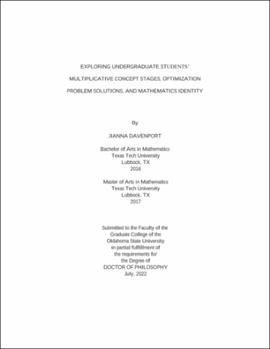| dc.contributor.advisor | Cribbs, Jennifer | |
| dc.contributor.author | Davenport, Jianna | |
| dc.date.accessioned | 2023-04-05T16:20:50Z | |
| dc.date.available | 2023-04-05T16:20:50Z | |
| dc.date.issued | 2022-07 | |
| dc.identifier.uri | https://hdl.handle.net/11244/337272 | |
| dc.description.abstract | Undergraduate students’ choices and success in their career and life is influenced by their mathematics achievement and perception of themselves in life. Conceptual understanding of topics in undergraduate mathematics such as quantitative reasoning can be difficult for students with less sophisticated multiplicative reasoning than others. This study explores undergraduate students multiplicative reasoning and its connection to their solutions to optimization problems and their mathematics identity. Data was collected in two phases and synthesized into three articles. The first article is the validation of an assessment. The second is a case comparison study on undergraduate student solutions to optimization problems. The third is a case comparison study of undergraduate students’ mathematics identity. In the first phase, the Undergraduate Multiplicative Concept Assessment (UMCA) and scoring rubric were developed and tested to provide evidence towards its validity as an appropriate assessment for undergraduate students. Data in this phase was collected from 51 undergraduate student assessments and 18 clinical interviews. Evidence towards the validity of the UMCA is discussed in the first article of this dissertation. In the second phase of data collection, 43 undergraduate students in an entry level math course took the UMCA and five of these participants participated in an interview. This interview was given in two parts: a semi-structured interview on their mathematics identity and a clinical interview asking them to solve optimization problems. Results from the clinical interview were discussed in the second article and results from the semi-structured interview are discussed in the third article. Findings from this study (1) supports the UMCA as a valid assessment for undergraduate students, (2) show that student solutions to the optimization problems included guess and check, tables, graphs, and equations and leveraged relational, algebraic, and covariational reasoning to get accurate answers, and (3) provides evidence towards the connection between students’ mathematics identity and multiplicative reasoning. | |
| dc.format | application/pdf | |
| dc.language | en_US | |
| dc.rights | Copyright is held by the author who has granted the Oklahoma State University Library the non-exclusive right to share this material in its institutional repository. Contact Digital Library Services at lib-dls@okstate.edu or 405-744-9161 for the permission policy on the use, reproduction or distribution of this material. | |
| dc.title | Exploring undergraduate students' multiplicative concept stages, optimization problem solutions, and mathematics identity | |
| dc.contributor.committeeMember | Zwanch, Karen | |
| dc.contributor.committeeMember | Utley, Juliana | |
| dc.contributor.committeeMember | Oehrtman, Michael | |
| osu.filename | Davenport_okstate_0664D_17848.pdf | |
| osu.accesstype | Open Access | |
| dc.type.genre | Dissertation | |
| dc.type.material | Text | |
| dc.subject.keywords | assessment | |
| dc.subject.keywords | mathematics identity | |
| dc.subject.keywords | multiplicative concepts | |
| dc.subject.keywords | optimization problems | |
| dc.subject.keywords | undergraduate students | |
| dc.subject.keywords | validation | |
| thesis.degree.discipline | Education | |
| thesis.degree.grantor | Oklahoma State University | |
